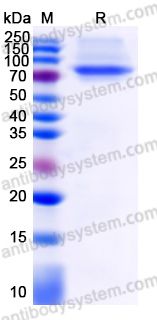Catalog No.
YHC10002
Expression system
E. coli
Species
Homo sapiens (Human)
Protein length
Glu2-Asp393
Predicted molecular weight
70.34 kDa
Nature
Recombinant
Endotoxin level
Please contact with the lab for this information.
Purity
>90% as determined by SDS-PAGE.
Accession
P04637
Applications
ELISA, Immunogen, SDS-PAGE, WB, Bioactivity testing in progress
Form
Lyophilized
Storage buffer
Lyophilized from a solution in PBS pH 7.4, 0.02% SKL, 1mM EDTA, 5% Trehalose, 2% Mannitol.
Reconstitution
Reconstitute in sterile water for a stock solution.
Shipping
In general, proteins are provided as lyophilized powder/frozen liquid. They are shipped out with dry ice/blue ice unless customers require otherwise.
Stability and Storage
Use a manual defrost freezer and avoid repeated freeze thaw cycles. Store at 2 to 8°C for frequent use. Store at -20 to -80°C for twelve months from the date of receipt.
Alternative Names
Antigen NY-CO-13, Cellular tumor antigen p53, P53, Tumor suppressor p53, TP53, Phosphoprotein p53
The puzzling regulation of the interferon signaling system by the p53 tumor suppressor protein., PMID:40512405
SASH1 Mutations and Hereditary Disorders of Pigmentation: Review of Literature., PMID:40511878
Genetic Markers as Predictors of Prognosis and Treatment Response in Patients with Oral Cancer: A Prospective Study., PMID:40511136
Integrating Aggressive-Variant Prostate Cancer-Associated Tumor Suppressor Gene Status with Clinical Variables to Refine Prognosis and Predict Androgen Receptor Pathway Inhibitor Response in Metastatic Hormone-Sensitive Setting., PMID:40508118
The Intrabody Against Murine Double Minute 2 via a p53-Dependent Pathway Induces Apoptosis of Cancer Cell., PMID:40508092
Mutant p53 Associates with Human Equilibrative Nucleoside 1 Upregulation and Better Response to Adjuvant Gemcitabine in Intrahepatic Cholangiocarcinoma Patients., PMID:40508069
Alterations in the Expression of a Set of miRNAs in Endometrial Cancer and Their Correlation with Clinical Variables and the p53 Signaling Pathway., PMID:40508024
Glucosylceramide Synthase, a Key Enzyme in Sphingolipid Metabolism, Regulates Expression of Genes Accounting for Cancer Drug Resistance., PMID:40507922
Mutational Patterns in Colorectal Cancer: Do PDX Models Retain the Heterogeneity of the Original Tumor?, PMID:40507920
The Role of Hydrogen Sulfide in the Localization and Structural-Functional Organization of p53 Following Traumatic Brain Injury: Development of a YOLO Model for Detection and Quantification of Apoptotic Nuclei., PMID:40507878
Anticancer potential of eugenol in hepatocellular carcinoma through modulation of oxidative stress, inflammation, apoptosis, and proliferation mechanisms., PMID:40506614
RNF216 inhibits ferroptosis in lung adenocarcinoma by promoting p53 ubiquitination., PMID:40506397
DNA damage response inhibition is an early event in cadmium-induced breast carcinogenesis., PMID:40505819
Integrating metabolomics and network pharmacology analysis provides new insights into the lipid metabolism disorder of Abrus mollis., PMID:40505757
Structural dynamics of the wild-type p53 DNA-binding domain and hotspot mutants reveal oncogenic conformational shifts., PMID:40504558
The role of HSPB1 in modulating ferroptosis in pancreatic cancer via the TP53/SLC7A11/GPX4 axis., PMID:40504332
TAp73 as a potential key for understanding male infertility: a mini-review., PMID:40504304
Hereditary breast cancer beyond BRCA: clinicopathological characteristics and long-term outcomes., PMID:40504267
Defining CDK12 as a tumor suppressor and therapeutic target in mouse models of tubo-ovarian high-grade serous carcinoma., PMID:40504161
Loss of tumor suppressor p53 upregulates stem cell factor SOX9 via Notch signaling., PMID:40501825
AURKA inhibition amplifies DNA replication stress to foster WEE1 kinase dependency and synergistic antitumor effects with WEE1 inhibition in cancers., PMID:40501675
Generation and characterization of a mouse model of conditional Chd4 knockout in the endometrial epithelium., PMID:40501592
Molecular patterns and mechanisms of tumorigenesis in HPV-associated and HPV-independent sinonasal squamous cell carcinoma., PMID:40500270
Transglutaminase 2-mediated glutamine deamidation enhances p21 stability during senescence., PMID:40498452
HNMT Promotes the Occurrence and Progression of Nasopharyngeal Carcinoma by Inhibiting the IFN/TXNIP/p53 Axis., PMID:40498422
R-2-hydroxyglutarate-mediated inhibition of KDM4A compromises telomere integrity., PMID:40498073
P53-Induced Autophagy Degradation of NKX3-2 Improves Ovarian Cancer Prognosis., PMID:40497941
Progress of p53 Involvement in Central Nervous System Diseases and Targeted Drug Discovery., PMID:40495443
[DICER1-mutant primary intracranial sarcoma: analysis of five cases]., PMID:40494768
Inhibitors of p53 Apoptosis-Stimulating Protein Mitigate Acute Kidney Injury by Modulating the HIF-1α/SLC7A11 Pathway to Suppress Ferroptosis., PMID:40492946
Oxindole-Coumarin Hybrids With Broad-Spectrum Anticancer Activity: Apoptosis Induction and Selective CA IX/XII Targeting., PMID:40492425
FOXQ1 Suppressing Apoptosis in Colorectal Cancer Cells by P53 Deacetylation., PMID:40491105
Corneal Sensory Denervation Causes Epithelial Ferroptosis and Delayed Healing in Mice., PMID:40488714
Mechanisms Underlying the Therapeutic Effects of Brucea javanica in Cervical Cancer Treatment Based on Network Pharmacology and Molecular Docking., PMID:40487864
Targeting the JAK2-STAT3-UCHL3-ENO1 axis suppresses glycolysis and enhances the sensitivity to 5-FU chemotherapy in TP53-mutant colorectal cancer., PMID:40487654
Single-Cell Transcriptomic Profiling Reveals KRAS/TP53-Driven Neutrophil Reprogramming in Luad: A Multi-Gene Prognostic Model and Therapeutic Targeting of RHOV., PMID:40486872
Identification of MDM4 as a Prognostic Biomarker and a Target for Therapeutics in Colorectal Cancer., PMID:40485064
Downregulation of Alox5 Inhibits Ferroptosis to Improve Doxorubicin-Induced Cardiotoxicity via the P53/SLC7A11 Pathway., PMID:40485049
Assessing the influence of TP53 polymorphisms and haplotypes on bioelectrical impedance analysis parameters and nutritional status in aging Iranian population., PMID:40481964
p53 reveals principles of chromatin remodeling and enhancer activation., PMID:40479707
Protein Kinase D Knockdown Alleviates Vascular Calcification Through P53-SLC7A11 Axis-Mediated Ferroptosis., PMID:40474563
A radiogenomics study on 18F-FDG PET/CT in endometrial cancer by a novel deep learning segmentation algorithm., PMID:40474131
Comprehensive morphological, immunohistochemical, and molecular characterization of congenital pulmonary airway malformation (CPAM)., PMID:40473982
Lipid Droplet-Organized MDM2-Mediated P53 Degradation: A Metabolic Switch Governing Diet-Driven Tumor Progression., PMID:40470795
Real-world survival outcomes and MDM2 prevalence in US patients with metastatic dedifferentiated liposarcoma., PMID:40468683
[Mechanistic study on low expression of Ace2 gene activated senescence-related signals and promoted the progression of silicotic fibrosis in mice]., PMID:40468507
Crosstalk Between the Oncoproteins of High-Risk Human Papillomaviruses Types 16 and 18 in Colorectal Cancer Cell Models., PMID:40468102
The hydroxamate based HDAC inhibitor WMJ-J-09 induces colorectal cancer cell death by targeting tubulin and downregulating survivin., PMID:40467895
Apoptotic effects of cold atmospheric pressure plasma on A549 and LL/2 lung carcinoma cell lines., PMID:40467678
Investigation of Structural Mechanisms Underlying p53 Dysfunction Caused by 148 Missense Mutations Using AlphaFold3 and Molecular Dynamics Simulations., PMID:40464633

